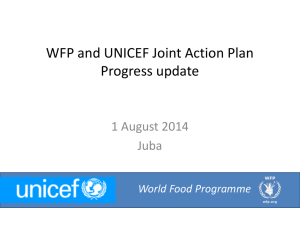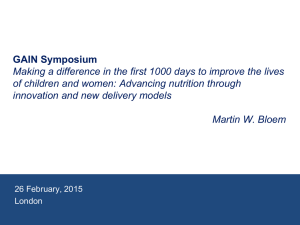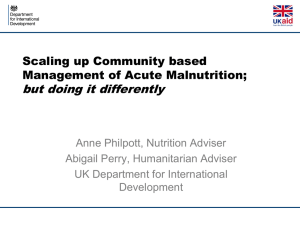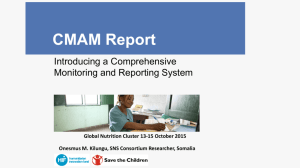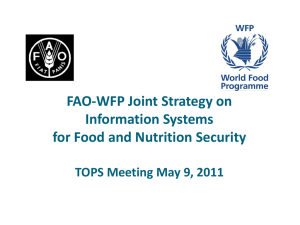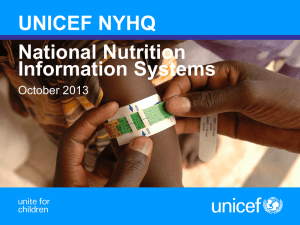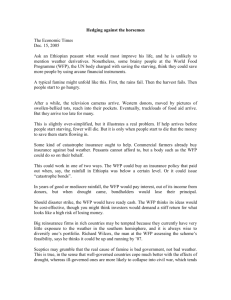Philippines - Nutrition Cluster
advertisement
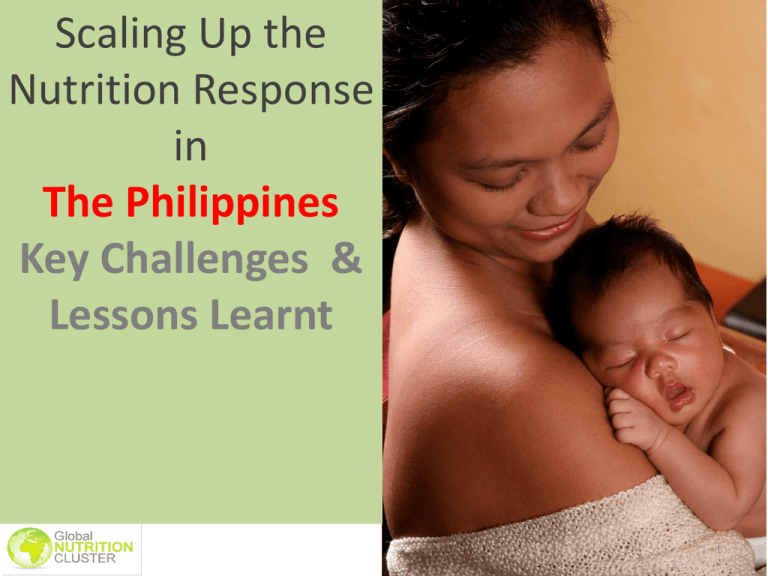
Scaling Up the Nutrition Response in The Philippines Key Challenges & Lessons Learnt 1 Needs Assessment and Analysis 2 Needs Assessment and Analysis (1/2) • Primary Needs analysis showed high GAM-SRP Targets • Government-led needs analysis had limited nutrition focus • Limited capacity of AWG to adapt existing methods for L3 level disaster-Coordination Team taking over AWG (during initial months) • MIRA-1 (limited nutrition focus) & MIRA-2 was not linked to planning (timing and methodology) • SMART survey (3 months post Haiyan) showed GAM prevalence 2x lower than expected-SRP Targets overestimated?- Revised Targets Needs Assessment and Analysis (2/2) • Limited Technical capacity in nutrition surveys and analysis (Trained FNRI team busy with NNS) • Coordinated assessments were OCHA driven • High number of meetings and clearance protocolsbottleneck to cluster needs analysis • Time difference, tight deadlines affected HQ remote support on needs analysis • Disconnect between sub-national and national discussions • Limited use of response monitoring data to complement needs assessment 5 Strategic Response Planning 6 Strategic Response Planning (1/2) • SRP and prioritization centrally-prepared; minimal regional consultation • Limited number of partners and low capacity in CMAM • Overstretched HR capacity of government (ongoing 3 emergencies) • OCHA-driven process with tight deadlines and no flexibility, in-depth assessment and strategic discussion • Project Proposal development – less consultative (UNICEF/WFP and Partner centric)- limited government involvement Strategic Response Planning (2/2) • Scale up delayed heavily due to paperwork/approvals (PCA/FLA) • Lack of clear arrangements for shifting government capacities to affected areas from other regions-limited number of government staff for response Resource mobilisation 10 Resources… 1.Finance 2.Supply 3.People Resource Mobilisation: FUNDING 12 Funding challenges • 7 of 8 partners were funded through UNICEF and WFP, which delayed nutrition cluster capacity to scale up due to administrative procedures of delayed fund release • Government Funding was not tapped for nutrition Haiyan SRP planning and implementation ($10 M SRP funding covered through UNICEF, WFP and ACF) 14 Resource Mobilisation: SUPPLY Photo Courtesy: WFP Philippines 15 Supplies challenges • Prepositioned supplies stocks stretched - 3 ongoing emergencies • Partners brought CMAM supplies, limited consultation -led to duplication and excess • Limited CMAM capacity- limited ability to distribute excess supplies • Supplies for MNPs and RUSF only planned for 6 months in SRP- negatively impacted service delivery of MAM and MNP programmes after May 2014 17 Resource Mobilisation: HUMAN RESOURCE CAPACITY Human Resources-Challenges • Limited DOH technical staff/capacity to respond- high staff retirement • Local government personnel were morally destabilized due to losing relatives and infrastructure damage • Still a need to develop and cost a capacity development plan as part of preparedness efforts 20 Implementation and Monitoring 21 Cluster SRP achievements As of end August 2014 137% BSFP beneficiaries *(6-59 months) MNP beneficiaries (6-59 months) 102% IYCF counselling (pregnant and children 023 months) 49% - 50,000 100,000 150,000 200,000 80% SAM admissions (6-59 months) MAM admissions (6-59 months) 42% - Achieved 1,000 2,000 3,000 4,000 5,000 6,000 7,000 Target 23 Implementation and MonitoringChallenges (1/2) • Delayed programme implementation due to administrative delays (PCA/FLA) • Gap in supplies for MAM/MNPs due to pull out of WFP • IYCF counseling challenging due to limited partner and government capacity • WGs focused on technical discussions rather than operational support at beginning • No approved national CMAM guidelines, lack of CMAM capacity 24 Implementation and MonitoringChallenges (2/2) • Some SRP indicators (IFA and Vit A) linked to routine reporting system- incomplete/under reporting • IYCF counseling indicator not reported by govt (only NGOs) • Community nutrition volunteers are overworked 25
